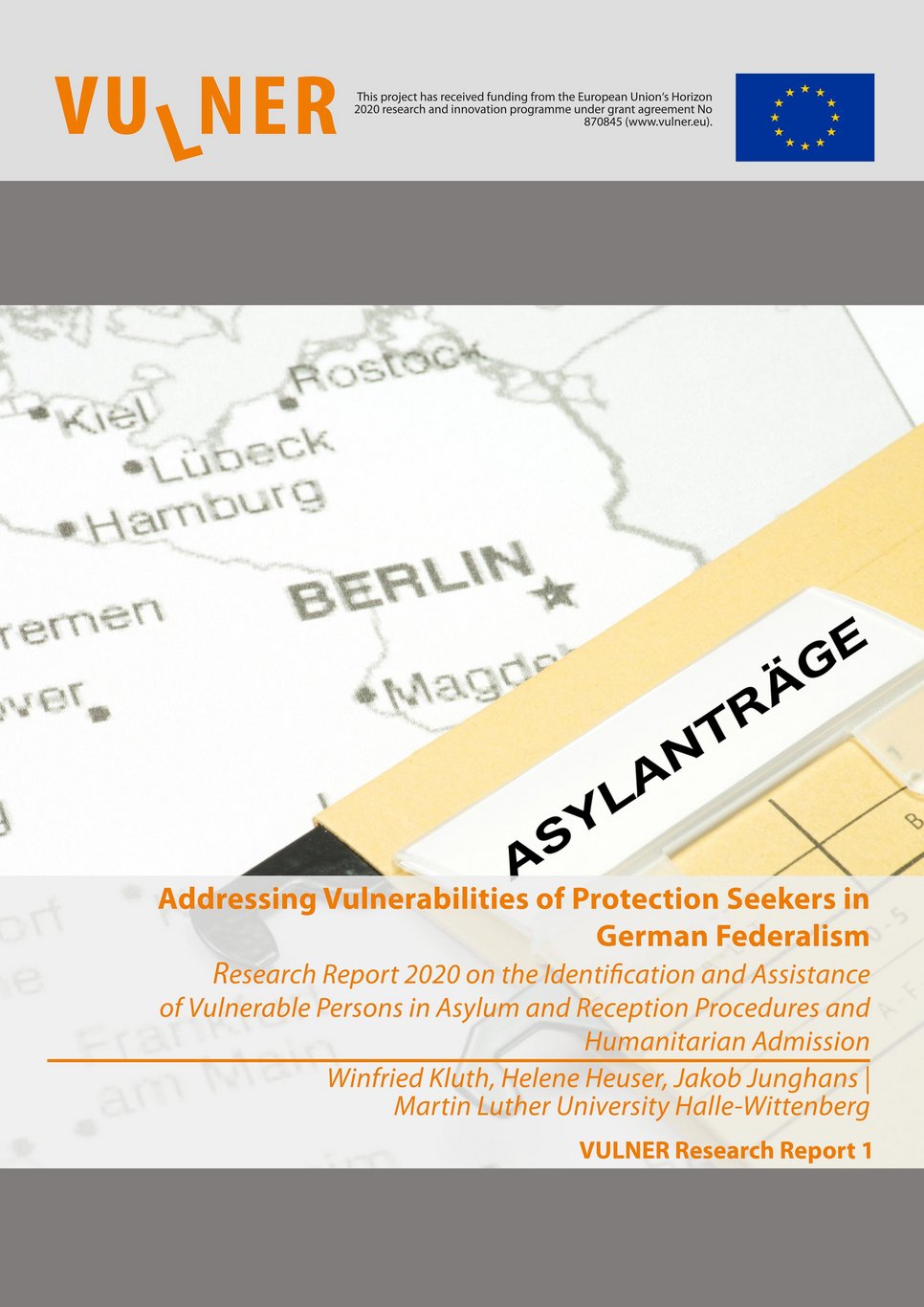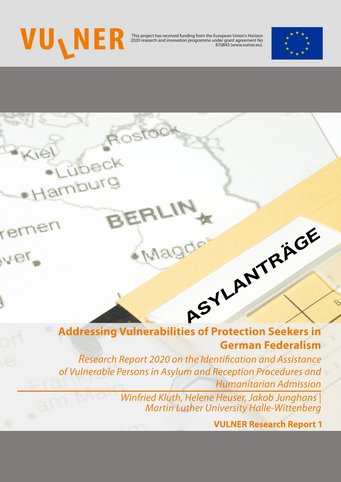Addressing Vulnerabilities of Protection Seekers in German Federalism
Research Report 2020 on the Identification and Assistance of Vulnerable Persons in Asylum and Reception Procedures and Humanitarian Admission - by Winfried Kluth, Helene Heuser, Jakob Junghans

In German law and legal research, the term and topic vulnerability are mentioned in various research contexts, but they are not given a central orientation function. Therefore, it is not easy to find thematically relevant studies with corresponding database queries, because they are assigned to other key terms.
The research was focused on three aspects:
1. the interplay of the international, EU and federal levels in a multilevel legal system
2. a systematic analysis of the existing norms, their implementation and efficacy
3. the special regulations and procedures relating to victims of human trafficking
the importance of different infrastructural settings (especially in regard of the activities and services of specialised NGO) in the different parts of Germany and their effects on satisfying the special needs of vulnerable migrants and protection seekers in general and victims of human trafficking in particular.
In German federalism the obligation to identify vulnerable protection seekers concerns on the one hand the federal state (Bund) and on the other hand the states (Länder), including municipalities (Kommunen). In this system the Bund carries out the asylum procedure, whereas the Länder and Kommunen are responsible for the reception in respective accommodation facilities. Together they have to guaranty the identification of special reception needs and procedural needs of protection seekers within the
asylum procedure.
The humanitarian admission of vulnerable protection seekers from abroad is mainly decided by the Bund. Since 2018 a range of Kommunen and Länder involve themselves proactively in the admission policy. They declared wanting to admit persons seeking protection from rescue boats in the Mediterranean and from Greek refugee camps, including minors, pregnant women, single parents, sick and old protection seekers.
The Federal Office for Migration and Refugees (Bund) has introduced some measures to address special vulnerabilities in the asylum procedure: Special representatives, e.g. concerning trafficking in human beings; administrative regulations, e.g. a list of indicators for trafficking; a counselling service by BAMF employees. However, the practical impact of these measures on the identification of vulnerable persons is an open question.
The fact, that in most relevant aspects the 16 Länder are responsible for the reception procedure and the corresponding legislation, was a great challenge for our research. Here, we found a big variety of different approaches, measures and instruments for addressing the vulnerabilities of asylum seekers. Our “map” of state regulations concerning the reception procedure and their provisions towards the special needs of vulnerable migrants can be grouped in 5 types of norms:
1. Parliamentarian act
2. Executive decrees
3. Internal administrative instructions
4. Operator contracts with reception centres
5. Strategic concepts
In all the states examined, there are also arrangements with NGOs which offer additional support, especially social and legal counselling, social care and other supports. The formal and informal cooperation with NGOs turned out to be very important and is to be examined more deeply. Many regulations were implemented or changed within the last three years, so that it was difficult to evaluate them.
Protection concepts against violence (Gewaltschutzkonzepte), here understood as a formal legal framework for reception centres, are the main way to address vulnerability in the Länder. Their implementation differs widely (regulations, administrative regulations, advices, contracts). Conversely, concrete legislative considerations of special needs remain the exception. The executive branch thus becomes a key actor – not only in implementation, but also in normatively addressing the needs of vulnerable protection seekers in general.
Regardless of the type of regulation, their references to single vulnerability criteria is as common as substantial consideration of vulnerability in general. In addition to minors, this frequently affects (pregnant) women, single parents and, in some cases, LGBTI+-persons. This gives us an idea of the German understanding of vulnerability. The mention of particular vulnerabilities is probably not least due to the fact that the discourse on obligations for certain groups of people has a longer tradition than for others and is also flanked by other human rights sources. Nevertheless, comprehensive consideration of vulnerability is necessary for implementing the EU-reception directive (RCD). Differentiation can and must be made only in the case of need-based support and within the framework of concepts for the protection against violence.
The accommodation in collective reception centres applies in principle also to vulnerable persons. The explicit promotion of collective housing, as in the states of Bavaria or NRW, must be viewed especially critical with regard to its risks for vulnerable persons. The approach of the city-state Berlin, which considers the placement of vulnerable persons in collective reception centres per se as unreasonable, is in contrast noteworthy but needs to be practically realized. In general, there is a difference in supply between city and territorial states, where access is much more difficult due to peripheral accommodation. Especially since it is sometimes impossible for specialized counselling centres (SCCs) to provide assistance simply because of the distance. This makes an internal relocation within the Länder an essential requirement. In this regard additional legal regulations are necessary.
The awareness for the special needs of vulnerable migrants is increasing, but is not sufficient at the moment in comparison with the provisions of International Law and European Laws, especially the Reception Directive. Increased attention should be paid to the training of employees in the reception centres and Federal Agency for Migrants and Refugees and other public institutions. As there are important regional differences in infrastructure for migrants and refugees with special needs, the reception procedure should be reformed, so that the identification and consideration of vulnerable persons is regarded as an integral part in the reception procedure in all parts of Germany.
Download the full report here.
